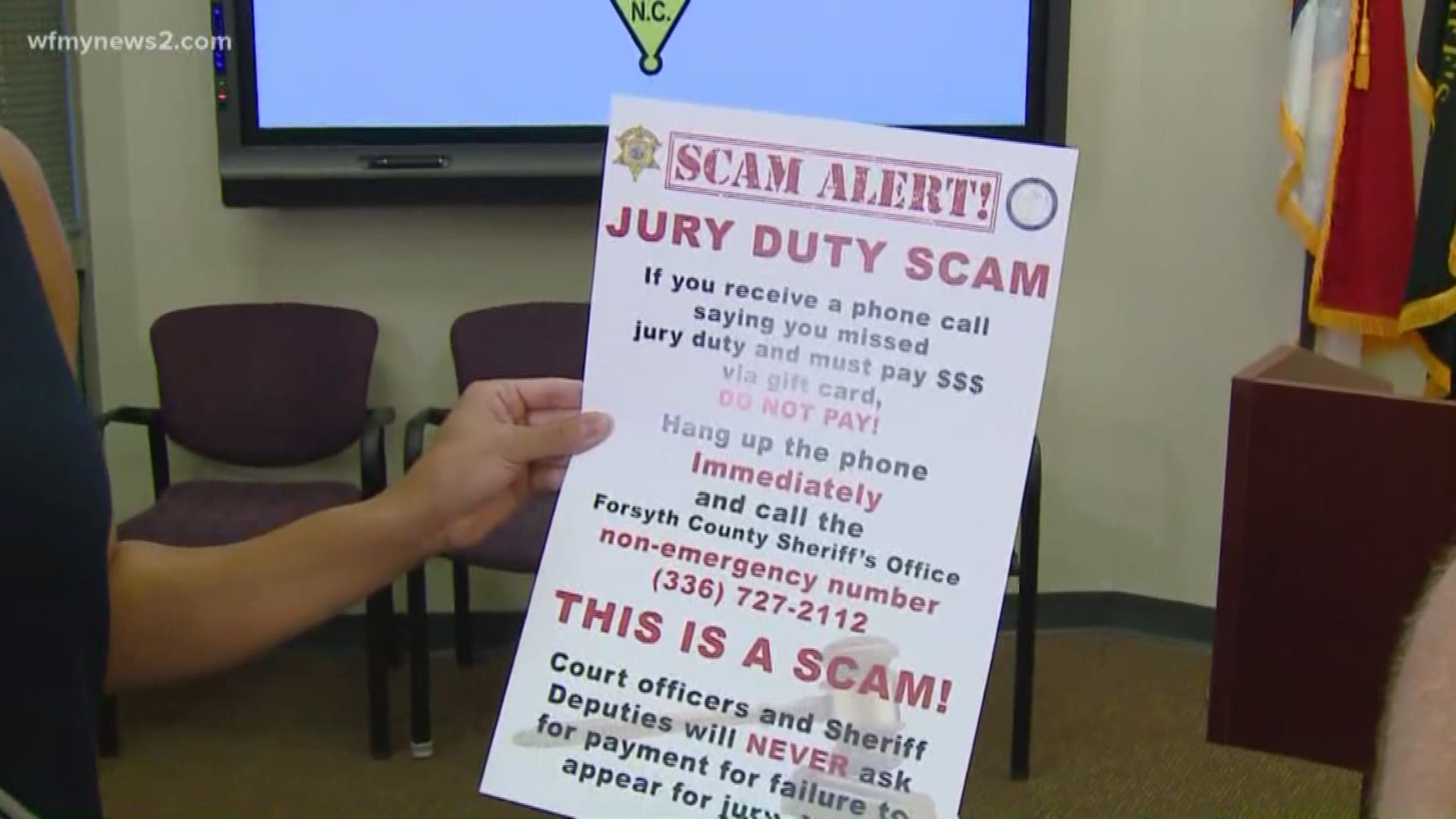FORSYTH COUNTY, N.C. — Telephone scams are a nationwide problem -- including in the Triad.
The Forsyth County Sheriff's Office is sending a warning to the public to be aware of phone scams.
The warning comes after deputies received a number of phone scam complaints.
Authorities say scammers are targeting residents and threatening them with prosecution for failing to comply with jury service in federal or state courts.
During the fraudulent call, scammers pressure residents to provide confidential information, potentially leading to identity theft of fraud.
The scammers are also threatening residents with fines and jail time if they do not comply.
The Forsyth County Sheriff's Office is sending a reminder top the public that court officers and deputies would never ask for payment for failure to appear for jury duty.
Federal courts do not require anyone to provide any sensitive information in a telephone call or email.
Most contact between a federal court and a prospective juror will be through the U.S. mail, and any phone contact by real court officials will not include requests for Social Security numbers, credit card numbers, or any other sensitive information.
Jury duty is a vital civic responsibility and should be taken seriously by all citizens.
However, it is a crime for anyone to falsely represent himself or herself as a federal court official.
If you receive a scam call, authorities say, you should hang up the immediately and call the Forsyth County Sheriff's Office non-emergency number at 336-917-7001.
The North Carolina Judicial Branch offers the following tips to avoid jury service phone scams:
How The Scam Works:
- Claim to be a judge or member of the court, local police, local sheriff's office, or a federal agency
- Often use the name of a real judge or officer obtained from a public source, and may even use a fake Caller ID of that office
- Often use details about you obtained from a public source
- Claim you have failed to appear for jury service or jury duty
- Claim you are in contempt of court or that a local or federal warrant has been issued for your arrest
- Claim that to avoid arrest and jail, you can pay a fine or bond typically requested in the form of a pre-paid debit or gift card, which makes it impossible to retrieve your money and difficult to track down the scammer
- Ask you to meet them at your local courthouse, police department, sheriff's office, or some other location
- Convince you to stay on the phone with them while you purchase pre-paid debit and / or gift cards and read the numbers back to them to confirm the purchase
- Ask you to confirm your identity by soliciting personal information, including your name, birth date, Social Security number, credit card number, and other personal or financial information
How to Protect Yourself:
- If you receive such a call, HANG UP without providing any information about yourself or taking any action.
- Trust your instincts. If the call does not feel right, hang up and do not engage the caller.
- You may be pressured into staying on the phone to purchase a money order, pre-paid debit card, or gift card, but you should resist and hang up. If asked to do so, please do not leave your home or place of work to meet the caller at any location, including your local courthouse or sheriff's office.
- Report any suspicious calls (or emails) to your local Sheriff's Office. Victims may also report it to the N.C. Attorney General's Office or call 1-877-5-NO-SCAM.
- You can confirm if you have been selected for jury service or failed to appear by contacting the clerk of superior court office in your county.
Things to Remember:
- In North Carolina, official jury summonses, as well as failure to appear notices, are always delivered to your home or post office box by first class mail.
- Court officials and law enforcement officers never make phone calls to threaten arrest or warn you of an impending arrest for failing to appear for jury service or any other infraction.
- These scam phone calls often occur in the evening, after courthouses have closed and employees have gone home for the night, which should be a red flag.
- Scammers obtain targets' names, phone numbers, or addresses from phone directories or other public records and often call after working hours because they know they have a better chance of reaching their intended victims.
- Caller ID can be manipulated to appear as a local number or display the name and phone number of any agency or business, so don't be fooled.
- Scammers often ask for payments of hundreds or thousands of dollars. The actual penalty for disobeying a jury summons is currently $50.00 for each time a juror fails to appear.
- If you have concerns, hang up and look up the courthouse phone number yourself (do not rely on any phone numbers provided by the caller) to verify with the jury coordinator or clerk of superior court's office if you have, in fact, been summonsed for jury service or failed to appear.
- Find more information about jury service and your local courthouse.

